Feature Image via Degrassi Wiki
Season fifty-eleven gazillion of Degrassi: The Next (Next Next) Generation kicked off last week. Before we get too far into bisexual cutie pie Imogen’s last semester in the show, we figured we should take a look back at last season. So welcome to Degrassi High, where every student gets cancer and there are too many spontaneous musical numbers for the characters to be as straight as they claim to be. Even though Degrassi killed off our favorite trans character, Adam Torres, the show made an attempt to appease the queers with some lesbian action, a touch of female empowerment, and a handful heteros with queer ambitions. Without further ado, here are the top 10 queer and feminist-y moments of Degrassi season 13.
10. Drew’s mom gives us a lesson on treating women with respect
Remember Drew Torres? So-called lady killer, champion of heterosexuality and stereotypical masculine chest thumping, and somehow the school president as of last season? The most interesting thing about Drew for the last few years — as far as I’m concerned — is that he is (or was) Adam’s older brother and gave producers an excuse to give Adam more screen time.
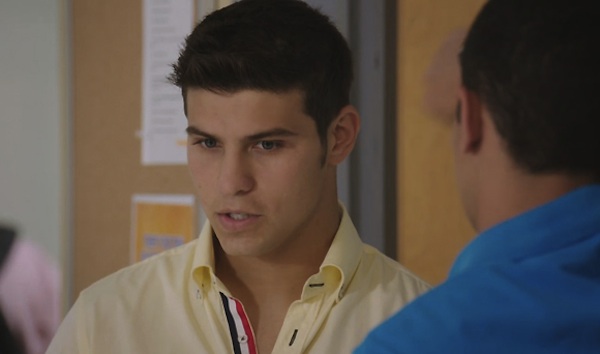
via MTV Canada
Am I really that irrelevant now?
Fortunately, Drew decided to get some ambition in his senior year by becoming a leader in the student council, and getting an internship with a douchey mayoral candidate. Even though he says he’s taking a break from women, we all know that on Degrassi, life decisions only last two minutes of real world time and one episode of screen time. Obviously, he starts dating a sophomore named Zoë Rivas after an outfit change.
In an attempt to stay true to his no-dating commitment, Drew claims that their relationship is casual and has sex with Zoë in a pool house to prove it.
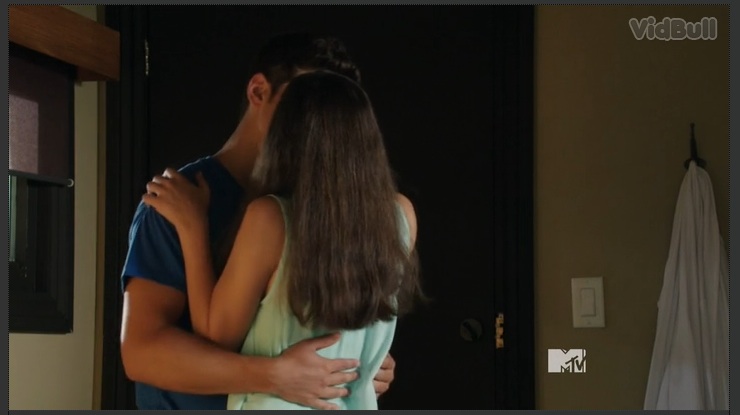
Zoë is not amused that Drew tells her post-sexy time that he wants to be casual, especially since their pool house dalliance was her first time having sex and she thought it was special. Zoë tells her mom that Drew is an asshat and Mama Rivas confronts Drew at a public Q&A session with the mayor that Drew is hosting for his internship. Awkward! The mothers and ex-casual-not-casual-pool house-frequenting lovers meet with Principal Simpson, who is probably the worst person to use as a conflict mediator and who helps resolve this conflict in no way. Drew faces no punishment because technically his pool house adventures were not statutory rape in Canada thanks to “close-in-age exceptions” in the law.
But when Drew gets home his mom is like, “Sike! I hate men like you!” She tells Drew that it’s important for him to be aware of why he’s having sex with someone and that it’s fucked up to use someone for sex.
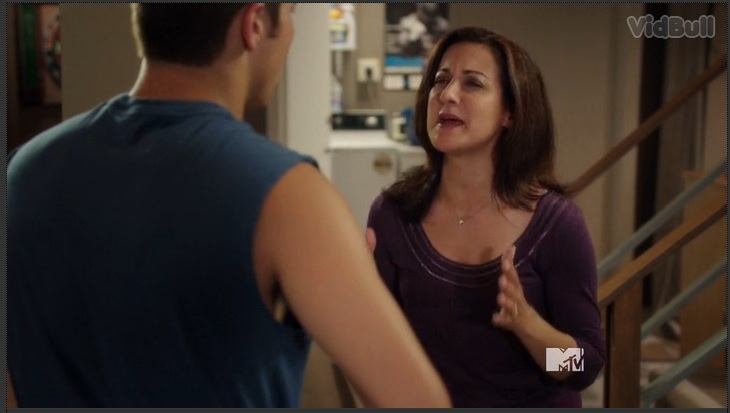
“Sex is serious especially for a girl, especially at that age. You did a dumb, selfish, insensitive thing.”
Her reasoning isn’t perfect, but thanks, Mama Torres, for educating your son. He needed to have several seats.
9. Clare joins a coven of dykes
Clare Edwards is yet another champion of heterosexuality, most often associated with former emo-kid/current NYU student Eli Goldsworthy. After the most yo-yo hetero relationship I’ve seen in a while with Eli, briefly dating her step brother, and then falling for Drew (I call witchcraft on this kid’s pheromones), Clare decides to focus on herself by training for a triathlon.
Who else would be the triathlon coach but new student, pot smoking dancer, and our resident Lady Homo, Jack. Jack sees straight (heh) through Clare’s struggle.
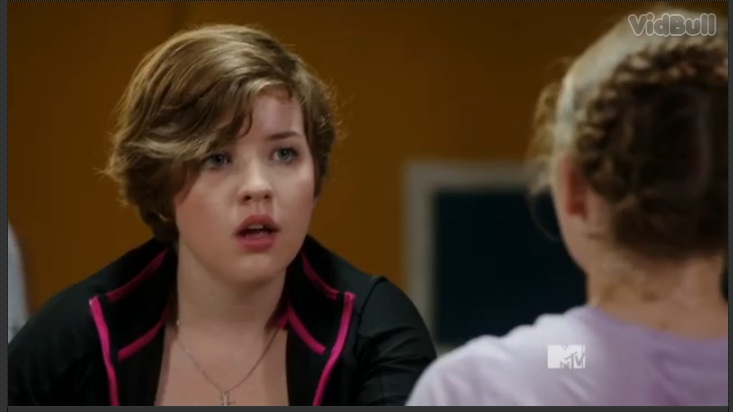
OMG a real lesbian sweating before me!
Jack: Lemme guess, just broke up with a guy and now you’re here to get fit.
Clare: Two guys actually. And my friends seem to have zero interest in hanging out with me.
Jack: Women.
Jack tells Clare to hang out with her and her friends for a better time, and take Clare … AXE THROWING!?!
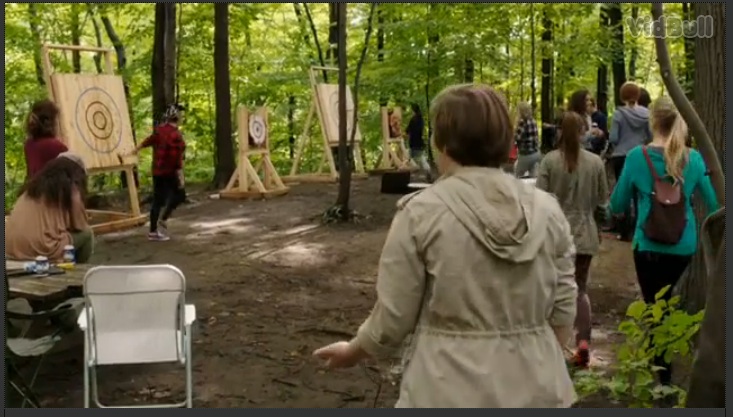
Clare: What is this?!
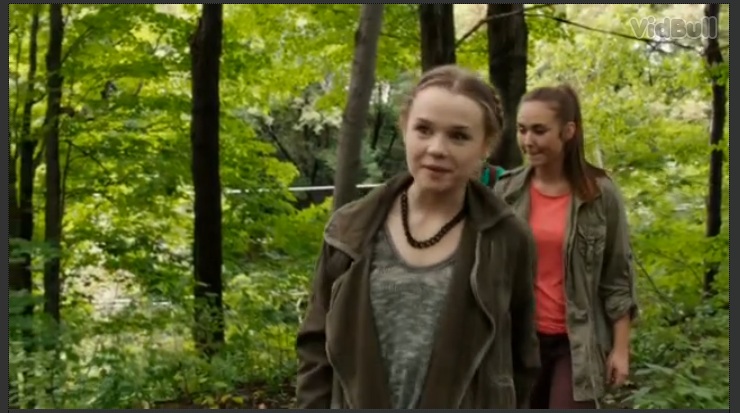
Jack: Backyard axe throwing week, duh.
Aka the gayest shit I have ever heard of. Let’s take a moment of silence for all of us women in the U.S. who did not know that in Canada y’all throw axes for fun, and who are now contemplating crossing the border. I can’t be the only one whose world was rocked this hard by axe throwing.
Jack offers Clare some really beautiful advice in this episode which I hope Clare takes to heart:
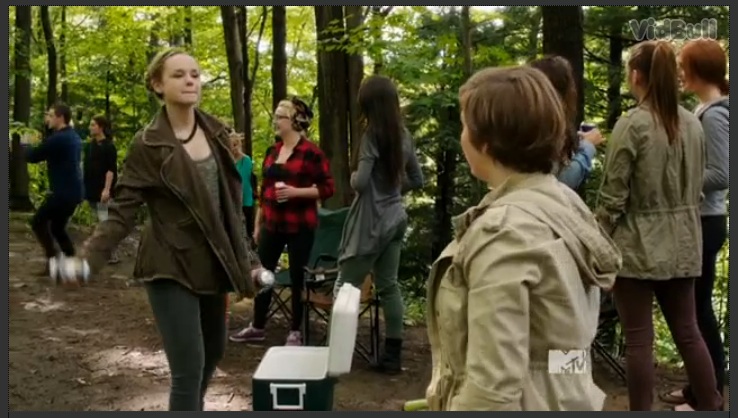
Casual flannel, casual beer toss.
“Take boys out of the picture and the whole world opens up.”
Jack’s raging misandry is a breath of fresh air, but proves too overwhelming for Clare, who feels the need to come out as straight at the end of the episode. Jack says they can still be friends, adding, “You’re a cool girl Clare, even if you’re a hetero.” Imogen better marry this woman or I will hop into the TV and marry Jack myself.
8. Imogen fights the system with feminism?
One of Degrassi‘s most consistent queer ladies is awkward heartthrob Imogen Moreno. She shows up to her French class late and is forced to make her presentation on Celine Dion as soon as she runs in the door because high school sucks. Imogen, in her rush, forgot to wear a bra, which is definitely not scandalous in my world. But, this douche-canoe named Luke starts making fun of the fact that everyone can see Imogen’s nipples. The French teacher pulls Imogen aside in what we hope will be a moment of breasted-people solidarity, but instead she tells Imogen that she’s distracting the class — which would’ve happened even if Imogen were wearing 20 bras because homegirl is a cutie — and needs to leave until she gets a bra.
In a meeting with conflict-resolving-failure Principal Simpson and Madame Brassiere, Imogen rightly complains that kicking her out of class for wearing no bra is sexist and irrational. Simpson concedes that nothing in the school constitution states that a student with breasts needs to wear a bra, but mentions that said constitution has language about community standards. Imogen is like fuck the noise! and uses her school television department, Degrassi TV, to shame the administration. She wears her bra over her shirt so that everyone will know her boobs are covered.
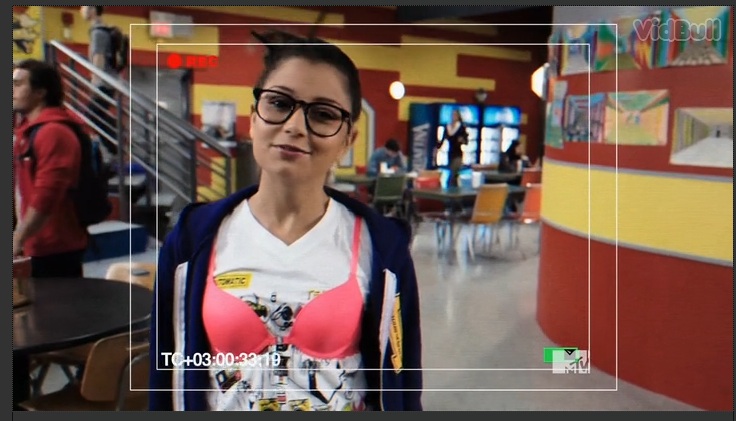
Simpson is mad as hell because boobs are scary and other breasted-folks are following Imogen’s lead. He’s also mad because Imogen takes her complaint a step further by pointing out that the dress code specifically aims to control female students’ appearances.
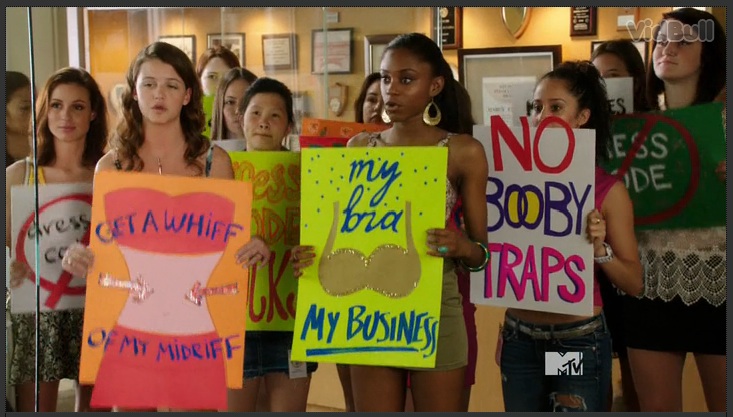
Simpson says that Imogen gets to decide how to amend the dress code, which is a harder task than Imogen anticipated. Imogen’s friend Becky spends most of this episode’s plot murmuring some respectability politics-informed feedback that we all ignore. Fortunately, Imogen tells Becky that the problem with dress codes is that they limit the creative self-expression of all people, and that the solution isn’t just forcing male students to wear tutus or stop wearing their pants low. After some questionable statements about feminism and what Gandhi would do, Imogen proposes a new dress code where students can wear whatever they want as long as their intention is not to distract other students or to disrespect themselves. I’m not exactly sure how the administration plans to enforce this, and the language of “disrespecting themselves” seems like it might lead to some problems down the road; but Degrassi‘s knack for continuity is only a little better than Glee‘s, so I don’t think anyone will be inconvenienced by the dress code for another 14 seasons.
7. Grace is a character
Grace Cardinal has to be the best secret homo sidekick since Alex Nuñez (seasons 3-6). She rocks blue hair and numerous piercings, confronts her male friends when they say problematic things about women, is not afraid to call people out for treating the students in remedial classes like trash, and helps expose two students who sexually assaulted Zoë Rivas (more on that to come).
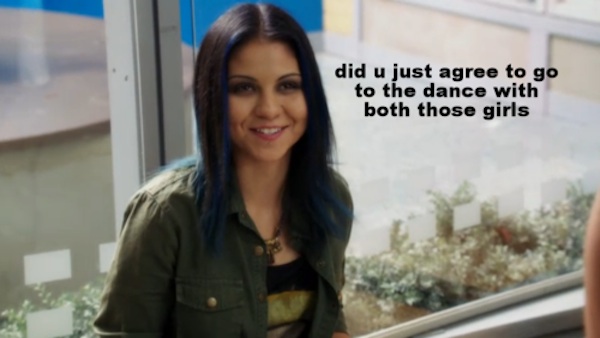
via Tumblr
Grace understands the queer struggle and pities you not at all
Grace has not gotten a plot of her own, but she is a nice contrast to sidekick characters like Connor or Winston (aka Chewy), who literally spend seasons making white characters feel better about themselves before they get any kind of development. Grace isn’t a stand alone character yet, and we don’t learn why she is placed in the “Rubber Room” for remedial classes, but I think she shows potential. Also, everything about her screams baby queer to me so I am excited for her to embrace her lady-loving feels someday. And, if the producers decide to kill or write off the queer ladies (again), we may have a survivor!
6. Becky tries to be gay
As a former conservative Christian/misguided biddie, I sympathize with Becky’s struggle. Except I’m actually gay but that’s a different story. Becky Baker became a somewhat decent LGBTQ ally when she started dating Adam Torres, but maybe we hate her because she killed Adam. (Okay, no she didn’t but she may as well have.) Without a boo, she doesn’t really have anyone at school to call a friend until she bonds with Imogen. They have all the BFFL feels until Jack transfers to Degrassi mid-semester and mid-season. Imogen tries to do the thing where you’re totally into that cute lady and you’re 85% sure she’s queer, but you don’t know how to flirt so you ask said potentially queer person to spend all of their time with you and your friends while you try to find out how they identify and learn how to flirt. Becky is not amused because she knows about the lesbian merge and doesn’t want to lose her new BFFL.
Becky makes mistake number one and asks Drew for advice. Drew’s like “Have a ladies night,” which theoretically could’ve worked if Becky didn’t ask Imogen to go to Degrassi’s Sweethearts semi-formal dance with her so that the two could get to know each other more “intimately.” Becky goes back to Drew for advice, because as a man and as the straightest dude ever he must know about queer women. Drew advises:
“You could become a lesbian. Or pretend to be a lesbian.”
And that’s how MTV came up with the idea for Faking It.
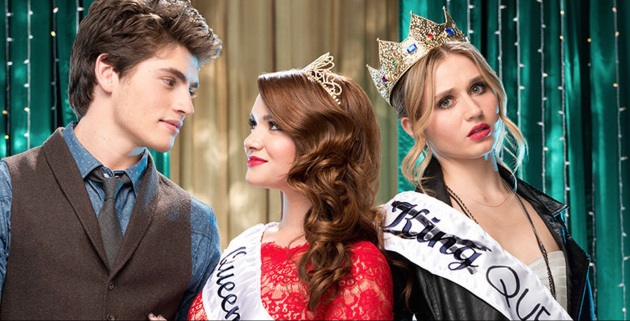
via Project Casting
Jack is not amused when she finds out that Becky is jacking her swag and tells Becky to do better.
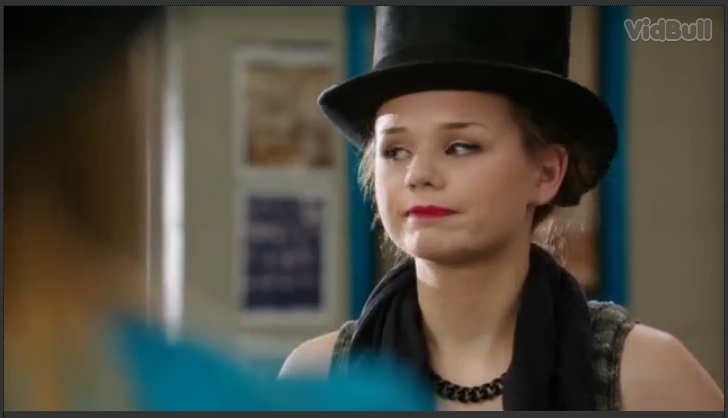
This is why I hate straight girls…
Jack: “But you’re not gay…”
At the semi-formal, Becky and Imogen slow dance for a hot second and then Becky also comes out as straight. When Becky blurts out that she can’t be a lesbian, Imogen is actually really happy.
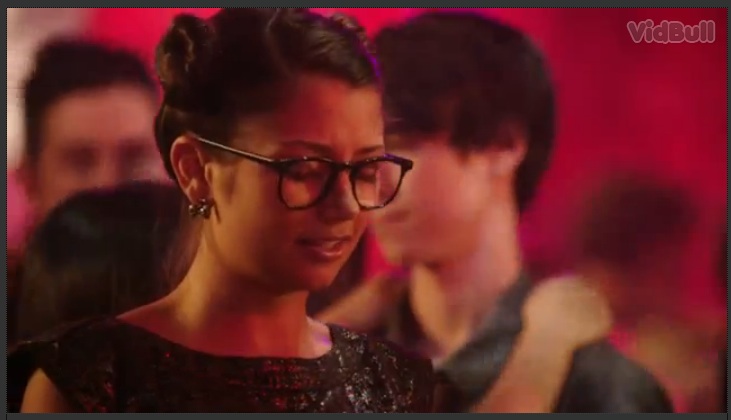
She was clearly praying to the queer ancestors that no one actually shipped her with Becky
Imogen: Oh thank goodness!
Becky: Why? Because you already hate me?
Imogen: No, because you’re my first girlfriend at Degrassi that isn’t my girlfriend. Fiona and I used to be inseparable but now we barely talk.
#LezzieTruths
#BeckyTried
5. Jackogen!
After Becky’s failed attempt to be a lesbian, Becky rushes to find Jack and ask her to swoop in with all the gay feels. Jack is brooding by a window, having a 5eva alone lesbian moment. I’m sure we’ve all been there before.
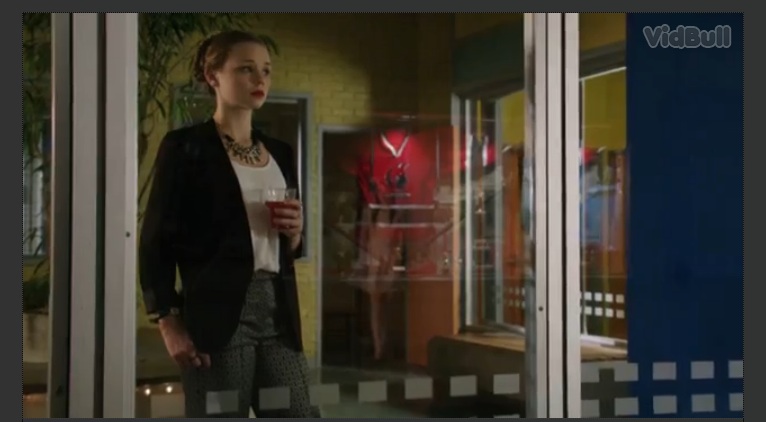
Someday my princess will come…
Becky chooses to redeem herself by foregoing queerness in exchange for wing-woman status.
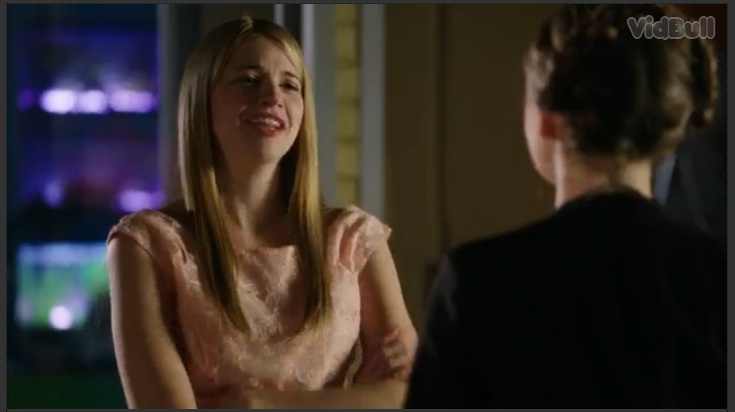
“Did they teach you how to share in Germany?”
Yes, Becky actually goes with that line, which could be a great opener for a threesome in Degrassi: The Next Generation of Soft Porn [It Still Goes There]. But alas, Degrassi chose not to venture into polyamory or multiple partner consensual sex just yet. Becky tells Jack to ask Imogen to dance, thereby making Jackogen canon!
Jack and Imogen are really special, in my opinion, because they are the first queer lady couple on Degrassi that mindfully entering into a relationship instead of stumbling into one. From Alex and Paige, to Fiona and that hot biker chick named Charlie, to even Imogen and Fiona, both pairings were characterized by one or both partners’ confused/confusing first attempts to move beyond heterosexuality. Their stories were beautiful and I think very valuable because not every LGTBQ identified person knows they are queer, or simply not straight, from the time they were in the first grade.
However, I think it’s equally important to show a character (Imogen) who was once unsure of their attractions pursuing a new relationship, and another character (Jack), who seems pretty confident in her queerness, reciprocating the feelings. For many of us queer ladies, there aren’t enough representations in the media of just going out into the world and falling in love, lust, and all the other yummy romantic bits and pieces of life. It is refreshing to see the relatively healthy depiction of two women meeting, connecting, hanging out, and winning each other’s affections.
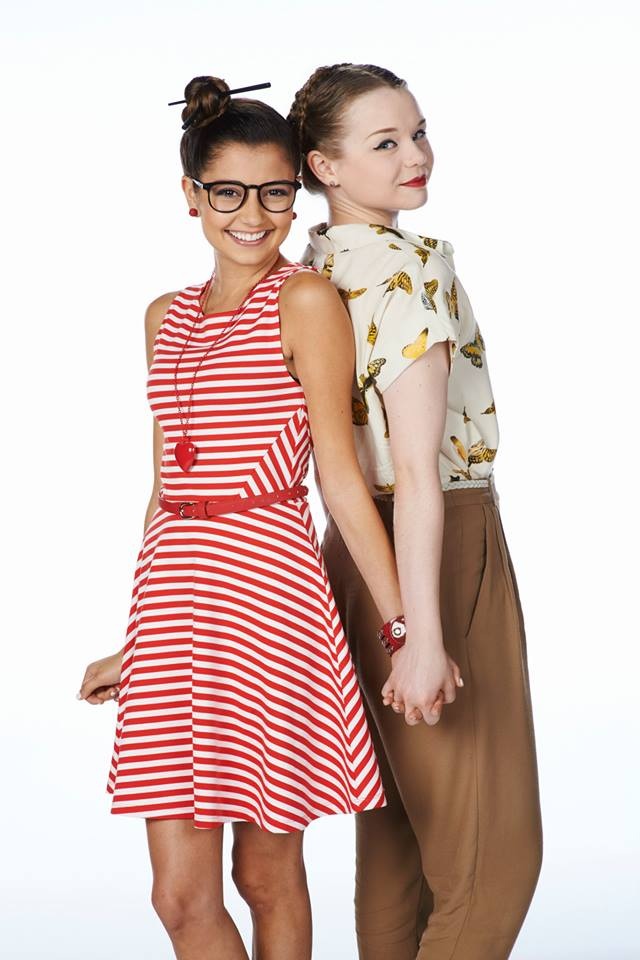
via Degrassi Wiki
4. Ali’s domestic violence situation
Degrassi has touched on the subject of domestic violence and teen dating violence in the past, but given that one in four women will experience domestic violence in her lifetime and that one in three teenagers in the U.S. will experience some form of abuse from a dating partner, I think these narratives need to be represented often and in more nuanced ways.
In season 13, after a summer study abroad trip to Paris, France, Ali meets French citizen Leo. While they are abroad, he hits her once, but she forgives him when he promises to get help. Leo moves to Canada, plans to enroll in a college near Ali, and the two continue their relationship. Unfortunately for Leo, his visa is rejected and he will have to return to France. Ali decides to celebrate her 18th birthday by eloping with Leo so that they can be together forever (though they don’t even formulate a plan about how she will go about extending Leo’s time in Canada post-marriage). Not even three minutes after their speedy wedding, Leo and Ali get in a fight about telling their families the news. Leo interprets Ali’s reluctance to tell her parents that she’s married as a sign that she is ashamed of him. He gets incredibly angry and beats Ali, ultimately throwing her out of his car.
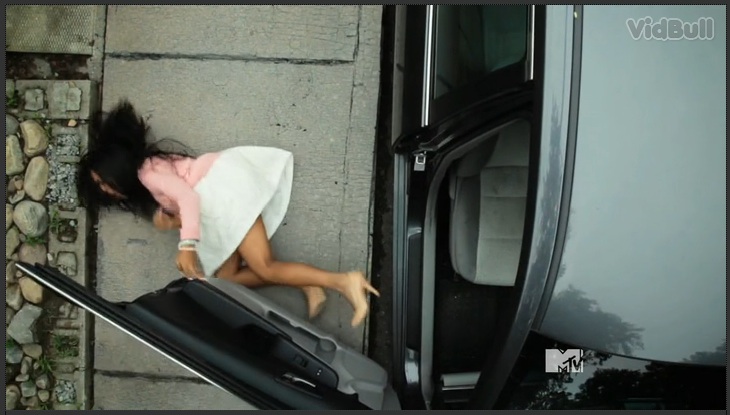
When Ali returns home, she tells her family that she was attacked by a mugger instead of telling them truth about Leo’s violence. Ali even lies to a detective about the incident. One of her best friends, Jenna, suspects that Ali wasn’t really mugged because Ali can’t keep her stories straight; Jenna correctly guesses that Leo was hitting Ali again — in spite of his promises to stop — but Ali doesn’t want to speak to the cops. Ali at least agrees not to protect Leo, and calls her husband to tell him that she wants an annulment. Leo, however, will not respect Ali’s wishes and tells her he’ll die without her. He even goes as far as to follow her to school and wait outside.
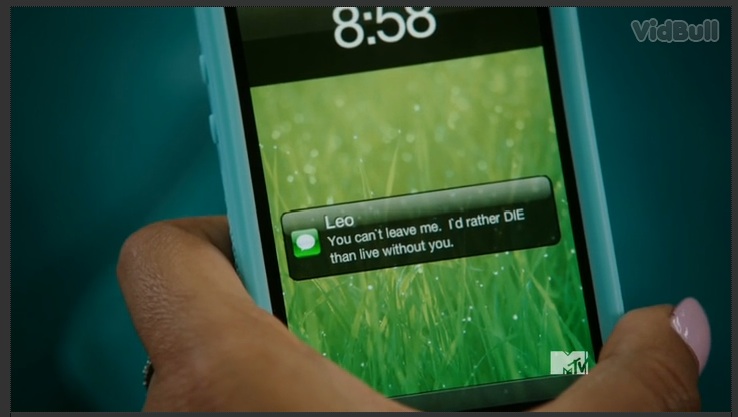
With the help of her friends Jenna and Clare, Ali finds the strength and agency to call the police. The cops arrive and drag Leo away, as Ali watches from the school steps.
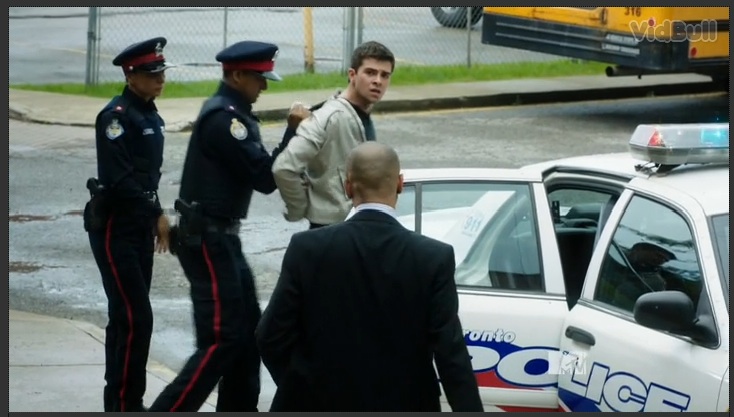
One of the most important aspects about this plot is that it demonstrates how many conflicting experiences and perspectives accompany intimate partner violence. Ali doesn’t immediately leave the relationship, or turn Leo over to the cops, illustrating how difficult it can be for a person to walk away from a domestic violence situation. It takes an incredible amount of strength and courage to admit that someone you care about has hurt you, and to report the violence, and I think Degrassi did well to convey that difficulty.
Furthermore, while Ali has the support of her friends, Jenna and Clare, her parents are pretty unhelpful in the whole matter. They engage in a lot of victim blaming, asking Ali how she could let such a thing happen, and saying that she’s such a smart girl who should know better. Her parents don’t understand that intelligence doesn’t protect someone from getting beaten or abused by a partner. I wish that more people in Ali’s life reminded her that she did not deserve to be abused, but unfortunately, domestic violence victims and survivors don’t always hear that message. Degrassi clearly didn’t cover all aspects of domestic violence or teen dating violence in this plot, but I think this storyline adds yet another layer to a chronic social issue.
3. Jack and Imogen’s pot-dance scene
I know I already talked about Jackogen, but I really think we need to talk about how Jack is furthering the gay agenda by seducing people through their televisions with drugs and a dance leotard. Out of nowhere Jack is a fucking dancer. Where’d that come from? No idea. Imogen is also so taken aback that she doesn’t recognize her own boo in a dance class with about six people dancing. The struggle is really real.
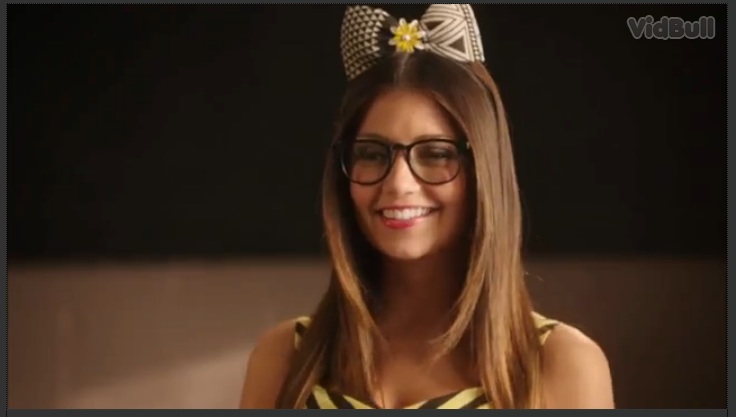
Is it too soon to rent a U-Haul? What if we just adopt a cat?
So Jack, who makes it difficult to avoid “jack of all trade” puns, shows off her muscles and some floaty dance moves that make Imogen quiver in all the gayest ways, and teaches Imogen how to smoke pot. I’m not sure if Jack is supposed to be the kind of lesbian that turns sweet women like Imogen into bad asses and then breaks their hearts, or if Jack is just really rad — I’m hoping for the latter — but Degrassi producers are definitely throwing queer women a bone with the sultry Jackogen moments. They even whipped out the funky mood lighting for us. You know the queer lady couple is doing well when it inspires fan videos like this one:
2. Becky uncovers a sexual assault case at Degrassi
After a giant party thrown by a sophomore named Miles (who happens to be the mayoral candidate’s son), a video circulates around Degrassi students of a naked Zoë Rivas fondled by two unrecognizable men. Becky initially approaches the issue from another respectability politics-informed position, where she feels the need to make a PSA for Degrassi TV about the dangers of women drinking. Becky believes that women should know that they are responsible for what they do when they drink. After an anonymous sympathizer, the Watcher, sends Becky additional videos that show that Zoë was clearly unconscious when the two men were touching her, Becky shifts positions on the issue. Her PSA ultimately becomes an attempt at investigative journalism as Becky comes to the conclusion that Zoë was unknowingly assaulted, and that regardless of how much someone drinks, no one deserves to be raped.
A particularly incriminating video sent by the Watcher causes Becky to think she knows who raped Zoë. She tells Principal Simpson about the incident only because she wants permission to air her new piece for Degrassi TV about the sexual assault. It’s pretty fucked up that Becky wants to air a story about someone being raped, without the survivor’s consent; but, Becky’s efforts force the school to get the police involved. As it turns out, Becky accused the wrong students of raping Zoë, which leads her back to square one. Grace reveals herself to Becky as no other than the Watcher (see what I mean about how awesome Grace is), to apologize for accidentally getting Becky to make a false accusation about the rape. To atone for her mistake, Grace comes up with a new scheme. Using the security tapes from the party to identify all the pairs of men seen together at the party, Grace suggests that they email one man from each pair with the message: “I know everything, your buddy ratted you out.”
Following the plan, Becky sees her brother Luke (aka the douche canoe that made fun of Imogen for not wearing a bra) and a friend of his fighting about Grace’s/the Watcher’s accusatory email.

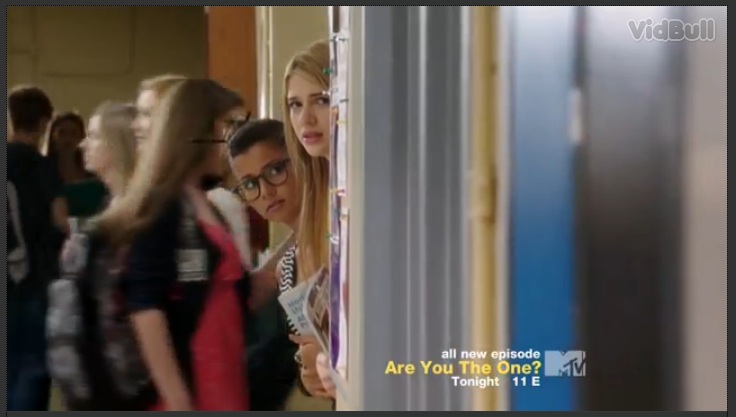
Becky finds Luke later, and tells him that she left her science project and cell phone at home. She asks to borrow his cell phone so that she can call their parents and ask them to bring her work to school. Luke lets Becky use his phone, but instead of calling home, Becky looks through her brother’s media; it turns out that he has videos of raping Zoë. Luke sees Becky finding the proof of his violence, but tries to convince Becky that he did nothing wrong. Luke defends himself with the particularly shitty excuse that Zoë “wanted” to fool around, and that Zoë had kept asking the boys if they thought she was sexy.
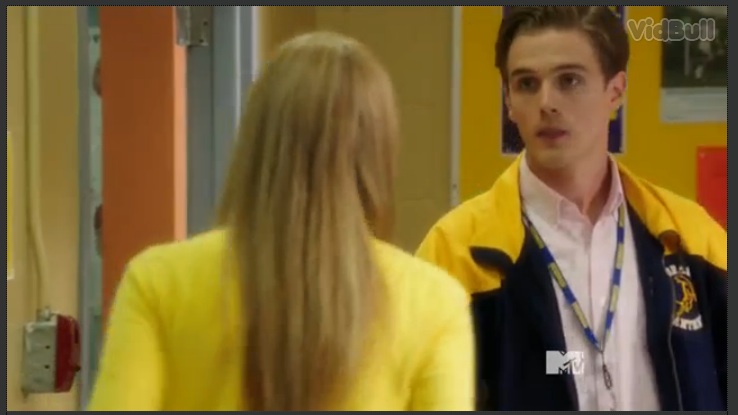
Luke: Whose side are you on?
Becky: I haven’t decided yet.
In the end, Becky decides that she is on Zoë’s side, and courageously turns over the evidence to the police. She even testifies in court saying that her brother admitted that Zoë never consented to his sexual advances, in spite of her brother and parents’ pleas for her to lie. I think that a lot of sexual assault storylines in television shows fall short of the mark because the writers are using trauma as a gimmick as opposed to a very important narrative. Degrassi impressed me with this depiction of bystanders’ responsibility to stand up for justice. Becky initially believed that Zoë and other women were responsible for what happens to them when drunk, but she was willing to expand her understanding of consent. Moreover, Becky’s storyline demonstrates how sexual assault can become a community issue, not just a problem between a victim/survivor and an attacker. Becky took a stance, even against her flesh and blood, and embraced a feminist cause of advocating on behalf of women and survivors of assault/rape.
1. Zoë’s sexual assault case
The storyline about Zoë’s sexual assault, from her perspective, wins the number one spot for top queer and feminist-y moments of Degrassi this past season. I think the narrative highlights some very important aspects about a survivor’s pursuit of justice, a victim’s emotional journey after a traumatic incident, and a young woman’s battle against the legal system, her social circles, and her attackers.
From the time Zoë wakes up naked in the pool house (yes, the same one she had sex in with Drew) after Miles’ party, she knows about as much about the previous night’s incidents as anyone else does. She blacked out after drinking throughout the entire evening, and is confused about her current situation. Zoë only discovers that she was assaulted after the Watcher releases the videos of the unrecognizable men violating her body, and after a gynecological exam that reveals trauma to her vagina. Through Zoë’s interactions with her classmates and even one of her attackers, we get a glimpse of various experiences that a survivor might undergo.
For example, Zoë confronts Miles, who put her in the pool house in the first place. She quite accurately holds Miles accountable for his actions that night, even though he initially thinks he is blameless.
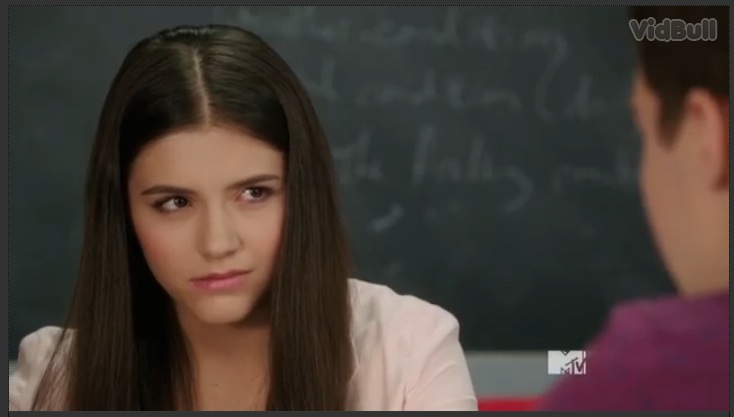
Miles: I did nothing —
Zoë: Exactly! You did nothing. You saw how drunk I was and you did nothing. Left me somewhere.
Miles: What was I supposed to do?
Zoë: Something — anything. Make sure I was safe. You let them do this to me.
I am glad that the writers tackled the question again of a bystander’s responsibility in the case of sexual assault or of violence more generally. Even though Miles put Zoë in the pool house when he saw that she was incredibly drunk to let her “sleep off” the effects of the alcohol, he could have done so much more to help her. This call out shows that rape and sexual assault impact and incriminate a community.
Later on in the same episode, Luke the rapist confronts Zoë to ask her to tell everyone that she was not sexually assaulted. At this point, Zoë doesn’t even know Luke was one of the men who assaulted her, nevermind pressing charges, but Luke is attempting to cover his ass after his sister sees the videos on his phone. Luke drops a lot of victim blaming bullshit and really harmful rhetoric often used to silence victims and survivors. It’s brilliant that the writers took the time to show that speaking up about one’s rape and/or sexual violence is even more difficult when people actively try to silence and shame the person who has already experience so much trauma.
“No one’s gonna believe you anyway,” brags Luke, the scum of the Earth. “I’m a good Christian boy, a hockey star… I’m on the basketball team. We can pretend it never happened.” Luke’s disgusting commentary sheds light on how reporting sexual assault becomes a he-said-she-said battle, and society mostly sides with the attackers. Initially, Zoë doesn’t even plan to speak up about the assault, but when she notices Luke flirting with her best friend before a basketball game, she announces to everyone that he is her rapist. She proceeds to physically attack him until Becky restrains her and tells Zoë that she doesn’t have to resort to a physical altercation. When Zoë breaks down crying, admitting that there’s nothing else she can do, Becky promises to give the evidence on Luke’s phone to the police.
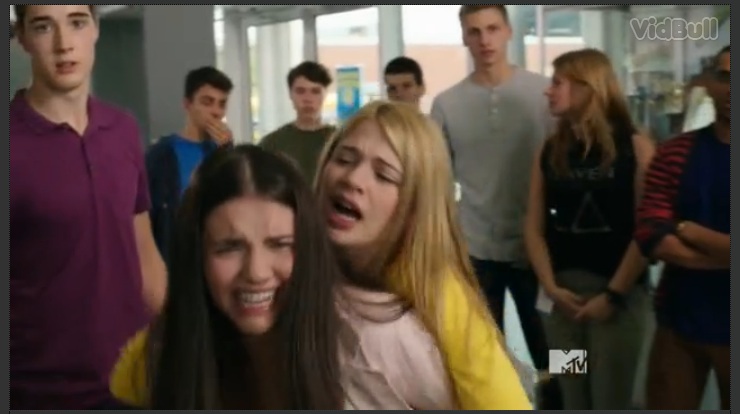
At the end of the season, we see Zoë’s trial, and how frustratingly painful it can be to be assessed and evaluated by the legal system. News reporters harass Zoë, and when Zoë ultimately speaks with one so that the world will hear her side of the story, the reporter twists the story so that the story released to the public portrays Zoë as an irresponsible young girl who “was embarrassed [after the party] and wanted the school to stop making fun of her so she said the boy assaulted her.”
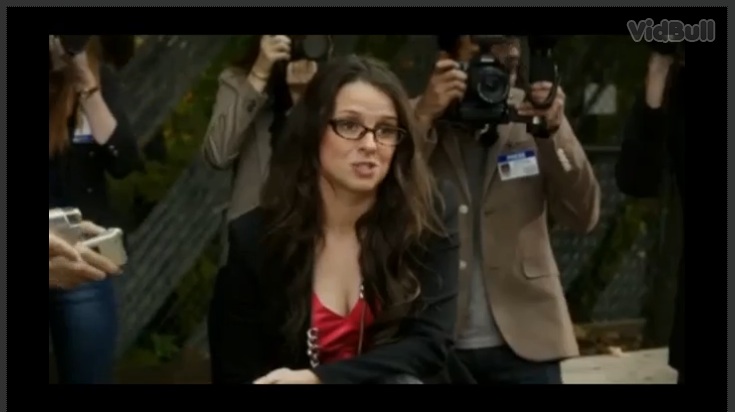
Reporter: We all make mistakes; we just don’t all take them to court.
During the trial, even some of Zoë’s friends agree with the press’s and defending attorney’s slut shaming rhetoric by suggesting that if Zoë hadn’t been so obsessed with boys that maybe she wouldn’t have been assaulted. To make matters worse, the press gets wind of Zoë’s past problems with abusing prescription drugs and uses it to further humiliate the young woman. Zoë steals some ambiguous pills from a classmate (Zig) who is dealing drugs, intending to overdose and end her life. Zig convinces Zoë not to kill herself, and instead to speak her truth before the judge. He is one of the few people who tells her that “No one deserves to be a victim.”
On the last day of her trial, Zoë makes her statement. Not only does she format her case as a problem that has affected her, but also she frames it as a community issue that effects all victims and survivors everywhere. Her plea is survivor-centric, surprisingly inclusive of other sexual assault experiences, and does the feminist work of advocating for sexual safety and justice.
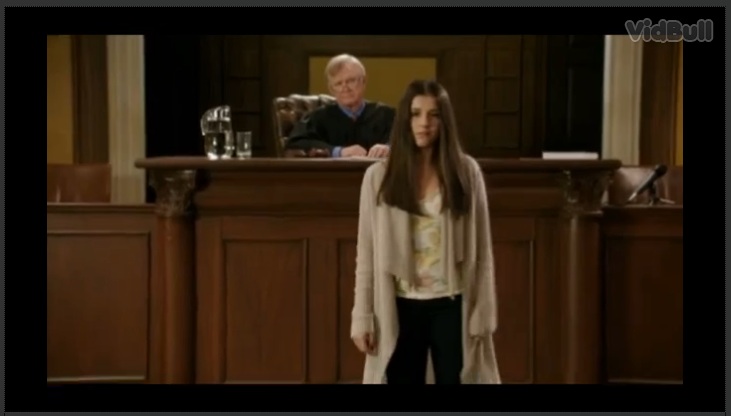
Zoë: I didn’t choose to be sexually assaulted. If you don’t convict Luke Baker and Neil Martin today, then you’re saying I deserved it. And you’ll be saying to other girls and boys that they’ll deserve it. I don’t think I want to live in a world where that’s true.
Luke and his accomplice, Neil, are convicted of distributing child pornography and of sexual assault. Zoë’s story features a happy ending that many survivors do not experience; not everyone can or chooses to press charges against the person or people who assaulted them. Not everyone can profit from the legal system, given that out of every 100 rapes, only 40 get reported to the police and only three rapists will spend even a single day in prison. However, by using a TV show geared towards young adults to highlight the prevalence and relevance of sexual violence, Degrassi joins the unfortunate minority of platforms that reach out to tell victims and survivors that they are not to blame for the violence they’ve experienced and to encourage communities to defend victims and survivors, while also doing work to prevent such incidences from occurring.
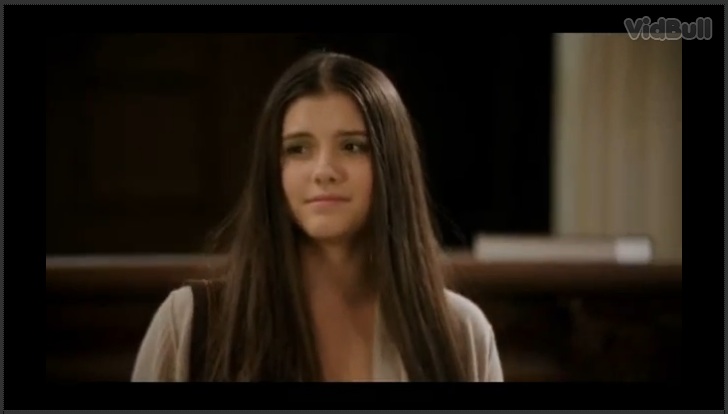
Last season, Degrassi gave us a lot to celebrate, to cry about, and to ship on our secret tumblr blogs where we write fanfics to the soft melodies of Tegan and Sara, and Mary Lambert. Hopefully season 14 brings with it more gays, more sexy dance scenes, and more socially relevant storylines!
Pages: 1 2See entire article on one page



I had to give up watching Degrassi when they killed Adam off, but this is kind of making me reconsider. Except I’m still hung up on Fimogen and I’m not sure I could move past them AND the fact that Adam won’t be there anymore =/
I was so impressed with that part of the Zoë assault storyline where Zoë calls Miles out for letting the assault happen by not doing anything. I was also impressed when Zoë quits the movie because she doesn’t want to be an example to other young women of giving up and not fighting back.
The Ali abuse storyline was well done, but I’m sad that it seems like the showrunners never let Ali learn from any of her past experiences about not telling her friends and family the truth (not that her parents are supportive the I wish they would be, because fiction and wish-fulfillment).
YASSS Degrassi on Autostraddle forever!! <3 <3 <3 <3
Also I would add Miles and Tristan making out to this list!! I think Miles potentially being bi/queer/questioning is awesome. There are so few portrayals of non-monosexual dudes on TV! #triles
I heartily agree! I’m surprised by how little coverage that storyline has got, given that non-monosexual teen male characters are practically unheard of.
An irrational part of my brain wants Autostraddle to recap/cover Triles because it’s about the only site that handles bisexual representation decently. (In fact, if anyone could point me to a site that covers male bisexuality in a non-heinous manner, that would be delightful.)
I was pleasantly surprised at the fact that the writers gave Imogen a new lady love, because typically, bisexual characters “go gay” for only one character, and then it’s opposite sex partners from then on. Good on the writers for not switching her same-sex attractions off after Fiona.
Helen, this is so good. You could teach an entire semester on this post.
I assure you that axe throwing is also A Thing in Northern NY and probably anywhere else that has the perfect storm of houses heated only by wood, queer girls, and limited internet access. We have a lot of time on our hands and also a surplus of axes. It’s a good life.
This was an awesome summary of a show I’ve never watched but always wished I did.
Sobering correction: in Canada, the number of reported sexual assault cases are much lower than 40%. It’s actually more like 6%.
http://www.sexassault.ca/statistics.htm
The fact that Grace is of Aboriginal descent has me hoping that the writers will touch upon the often ignored issues that plague Canada’s Aboriginal women.
I haven’t watched Degrassi in years, but as a NH native, I can tell you that I was raised with axe throwing. Like, my dad taught my sister and I to throw axes and knives and stuff and it’s pretty cool! So, totally happens outside of Canada.
And this is the story of how I became smitten with baby queer Jack from a few screencaps only to realize she’s played by my sisters shitty ex boyfriend’s kid sister. Turns out I can’t even get five degrees of separation from fictional Canadian queers.